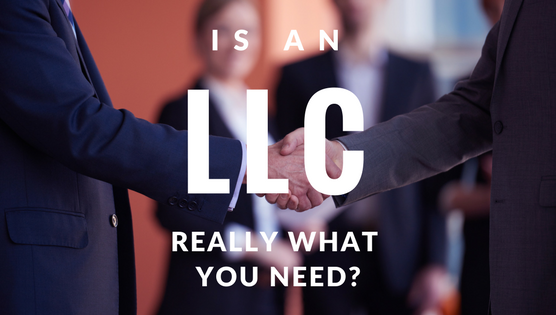Why LLC's Exist
 Many entrepreneurs default to an LLC when starting a business because they know all kinds of companies operate as an LLC, and it’s easy to set one up. Plus, the “LL” stands for “limited liability,” and who doesn’t want that? But it isn’t an all-purpose entity that’s appropriate for everyone in every circumstance.
Many entrepreneurs default to an LLC when starting a business because they know all kinds of companies operate as an LLC, and it’s easy to set one up. Plus, the “LL” stands for “limited liability,” and who doesn’t want that? But it isn’t an all-purpose entity that’s appropriate for everyone in every circumstance.
To understand the purpose of an LLC and who it is good for, it’s helpful to know how it came about and what the alternatives are.
THE TRADITIONAL TYPES
The business formations we hear about most frequently are sole proprietorships, partnerships, corporations, and LLCs.
A Sole Proprietorship is one guy who hangs a shingle out and says, “I'm doing business.” It’s easy to set up because he doesn’t have to file or maintain anything. But he also takes all the risk and, from a legal liability standpoint, he is 100% exposed. To use a baseball analogy, it’s like the sole proprietor is a batter swinging at pitches with nothing behind him – no backstop and no catcher.
A General Partnership is same thing; it just involves two or more people. It has the same ease-of-use benefits; the partners don't even have to have formal agreement. In Alabama and many other states, you can form a partnership with a handshake. This is even worse from a risk standpoint because you've doubled your liability. Suppose I shake hands with Frank, who I've never met before, and say, "Let's start a business.” He says yes, then goes off and incurs a lot of expenses he can’t pay. Those creditors can sue me because I'm Frank's general partner.
Corporations have been around for hundreds of years, but the way we know them today began back in the early nineteen hundreds. Until then, the traditional corporation allowed a group of people to go in together, put some money into a project, and say, for example, "We have this boat, and we’re going load it up with goods and send it across the Atlantic Ocean. But if it gets caught in a storm and goes down, we're not going to be liable to anyone for anything. We will simply lose the amount of money we've put into the endeavor."
That original idea of a corporation didn't work very well when companies began to be publicly traded, so corporations began to take on requirements for separation of powers, routine maintenance, etc. This worked really well for large, publicly traded companies, and these are the corporations we know today.
THE BIRTH OF THE LLC
The modern corporation doesn't work well for the guy who might be working out of his truck and needs limited protection. The LLC first came about in 1979 to fill the gap. Alabama didn’t enact the first LLC act until 1992, which makes most LLCs in our state younger than the internet.
An LLC gives you the protective “backstop” of a corporation. It protects your personal assets from getting drilled by a disgruntled vendor or someone who has an accident at your office. But it also gives you the flexibility of not having to deal with all the complex formalities required of a corporation. Though the LLC was originally designed to provide flexibility specifically to small business owners, you now see everything from the guy running a plumbing business out of his truck to large, multi-million-dollar companies, like BMW North America, operating as an LLC.
In my next post, I’ll discuss what kind of entrepreneur an LLC is best for.
